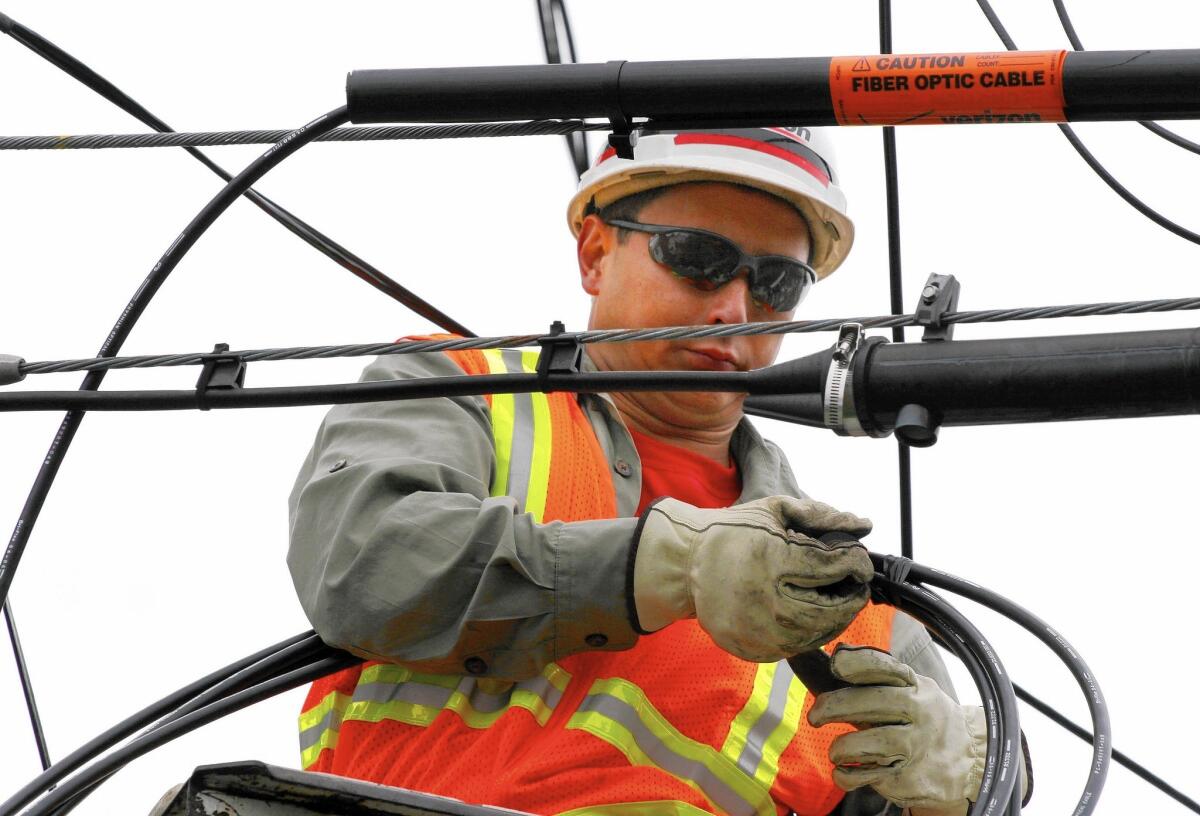Column: Switch to Frontier causes glitches for some former Verizon customers

- Share via
Before Frontier Communications took over Verizon’s landline phone, TV and Internet services in California on April 1, the company assured customers that it would make the transition “as smooth as possible.”
For many former Verizon subscribers, it’s been anything but.
“As soon as they made the change, my Internet service became spotty,” said Long Beach resident Bryan Merton, 56. “Now it’s gone completely.”
He was among dozens of now-Frontier customers who have contacted me in recent days to report technical issues, as well as frustrating encounters with Frontier’s customer-service department, which seems overwhelmed trying to address dissatisfaction with the change in corporate parenthood.
See more of our top stories on Facebook >>
Merton told me that he contacted Frontier to complain and was informed that the outage had nothing to do with the switch from Verizon.
“I asked what was causing it then,” he said. “The lady wouldn’t say, only that it had nothing to do with the changeover.” His Internet wasn’t restored until Monday afternoon.
Connecticut-based Frontier spent $10.5 billion last year acquiring the landline operations of Verizon, including its FiOS broadband connections, in California, Florida and Texas. The deal closed in March.
Some bumps were to be expected. Frontier spent about $8 billion in 2010 purchasing Verizon’s landline operations in 14 other states and then had to pay billions more upgrading Verizon’s neglected technology.
In 2014, Frontier spent $2 billion buying AT&T’s landlines in Connecticut. It subsequently issued $10 million in credits to local customers to compensate for technical glitches and not adequately staffing call centers to handle complaints.
Frontier presents itself as a top-notch telecom player. The company’s chief executive, Dan McCarthy, said in a recent letter to Verizon customers in California that Frontier “provides reliable communications services to millions of customers across the U.S.”
The reality is that Frontier is all about acquiring landline assets that bigger telecom companies no longer want in today’s cellphone-centric wireless world. The firm then makes a go of trying to profit from the other guys’ discards.
In California, Frontier has picked up Verizon’s copper phone lines along with its fiber-optic FiOS broadband network.
I’m not saying that Frontier is unreliable. After all, all the gear and workers the company has acquired in Southern California used to belong to Verizon, which is no slouch in running voice, TV and Internet networks.
But there’s a bit of a pig-in-a-poke aspect to the deal. For one thing, there’s a good reason Verizon is getting out of the landline business — it sees no future in it. So it’s reasonable to assume that the company hasn’t poured money into upgrading its system over recent years.
Frontier says it’s looking forward to bringing California customers “more innovative products and services in the coming year.” But it’s an open question how much it will be able to invest in network improvements. The company has a stock market value of about $6 billion but is carrying $16 billion in debt.
Los Angeles resident Melinda White said her phone, TV and Internet services continued without a hitch after Frontier took over her Verizon account. As it happens, she’s Frontier’s regional president, overseeing California and other Western states.
White said she is chagrined that a relatively small number of customers have had a bad experience — she put the total at around 1,700 customers. Overall, she said, the switch from Verizon has gone well.
“Every single customer is of utmost priority to us,” White said. “But when you look at a conversion of this magnitude, there were very few disruptions.”
She said Frontier added 3.3 million landline phone customers, 2.1 million Internet users and 1.2 million TV subscribers in California, Florida and Texas as a result of the latest deal with Verizon. She declined to break out specific numbers for California.
My sense is that Frontier really wants to make a good impression on consumers. For example, White said the company is closing down Verizon’s call center in the Philippines and moving all those jobs back to this country.
She also stressed that landlines aren’t disappearing from the telecom landscape, even if mobile is where all the growth is. “Landlines are still the most reliable form of communication,” White said.
But for how much longer? Landline TV and Internet connections are becoming more and more data-intensive, requiring greater amounts of bandwidth. During peak evening hours, streaming-video services account for nearly two-thirds of Internet traffic.
White said Frontier will invest at least $200 million in network upgrades over the next six years. But that money isn’t their money. It’s our money. It’s from a taxpayer-funded federal program called Connect America, which is aimed at expanding broadband service to rural areas.
I asked White how much of Frontier’s own cash it plans to invest in its system, but she declined to provide a figure.
This probably won’t sit well with Rancho Palos Verdes resident Ivan Goldman, 73. He signed up with Verizon six years ago for phone, TV and Internet service. Once Frontier took over, he told me, the number of recent movies available for on-demand viewing dropped off sharply and films he had bookmarked for future viewing were no longer listed.
“These sound like small things,” Goldman said. “But they promised a seamless transition and they’re still charging the same amount I paid before.”
When his Frontier contract is up this summer, he said, he’ll likely go back to Cox Communications, the cable company he left for Verizon.
“Frontier or Cox — it’s not a great choice,” Goldman said. “Sort of like taking poison or shooting yourself.”
That might sound harsh, but it’s a good reminder for Frontier that you don’t mess with people’s TV or Internet access.
David Lazarus’ column runs Tuesdays and Fridays. He also can be seen daily on KTLA-TV Channel 5 and followed on Twitter @Davidlaz. Send your tips or feedback to [email protected].
MORE FROM DAVID LAZARUS
Why cutting the pay-TV cord turned out to be a good move
Orange County program makes donating leftover food easier
Prudential pulls a fast one on long-term care insurance policyholders
More to Read
Inside the business of entertainment
The Wide Shot brings you news, analysis and insights on everything from streaming wars to production — and what it all means for the future.
You may occasionally receive promotional content from the Los Angeles Times.











